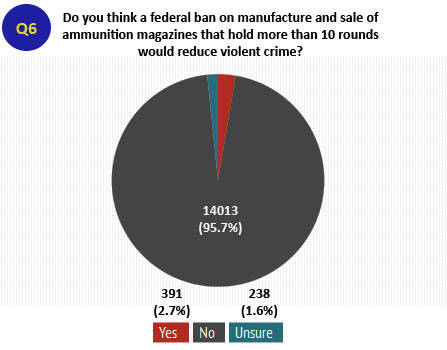Survey of More Than 15,000 Cops Finds Most of Them Oppose More Gun Control

The law-enforcement support site PoliceOne.com has released the results of a massive survey in which "more than 15,000 verified law enforcement professionals" were asked 30 questions about current gun control proposals. The results may surprise you.
"Contrary to what the mainstream media and certain politicians would have us believe," writes Police One Editor in Chief Doug Wyllie, "police overwhelmingly favor an armed citizenry, would like to see more guns in the hands of responsible people, and are skeptical of any greater restrictions placed on gun purchase, ownership, or accessibility."
The most telling results are these:
- "Virtually all respondents (95 percent) say that a federal ban on manufacture and sale of ammunition magazines that hold more than 10 rounds would not reduce violent crime."
- "The majority of respondents — 71 percent — say a federal ban on the manufacture and sale of some semi-automatics would have no effect on reducing violent crime. However, more than 20 percent say any ban would actually have a negative effect on reducing violent crime. Just over 7 percent took the opposite stance, saying they believe a ban would have a moderate to significant effect."
- "About 85 percent of officers say the passage of the White House's currently proposed legislation would have a zero or negative effect on their safety, with just over 10 percent saying it would have a moderate or significantly positive effect."
- "Seventy percent of respondents say they have a favorable or very favorable opinion of some law enforcement leaders' public statements that they would not enforce more restrictive gun laws in their jurisdictions. Similarly, more than 61 percent said they would refuse to enforce such laws if they themselves were Chief or Sheriff."
- "More than 28 percent of officers say having more permissive concealed carry policies for civilians would help most in preventing large scale shootings in public, followed by more aggressive institutionalization for mentally ill persons (about 19 percent) and more armed guards/paid security personnel (about 15 percent)."


Show Comments (82)